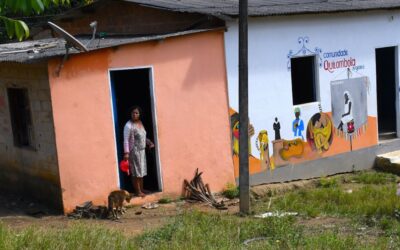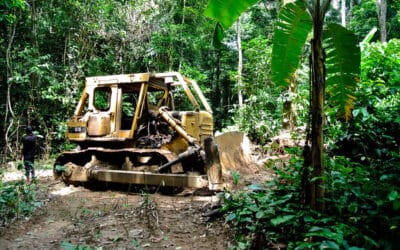“What happens to indigenous peoples and local communities when they are faced with environmental pressures like climate change, land grabbing and confiscation of their ancestral lands and territories? Some of them may succumb under the pressure, but many are more resilient: they find ways of coping and going back to their previous state of sustainability and equilibrium.” Taghi Farvar, Cenesta, Iran
5 November, Montreal: Indigenous peoples and forest groups [1] from around the world launched the results of over 30 community assessments from Chile, Ethiopia, Iran, Panama, Paraguay, Russia, Samoa, Solomon Islands, South Africa and Uganda of the resilience of their own biodiversity conservation initiatives and the diverse kinds of support required to sustain them [2]. The report was launched during an important UN meeting on the protection, promotion and use of traditional knowledge, innovations and practices relevant to the conservation and sustainable use of biodiversity [3].
The Community Conservation Resilience Initiative (CCRI) highlights conservation efforts protagonized by local communities themselves and their success in biodiversity conservation and restoration when compared to the weaknesses and inefficiencies of conventional conservation efforts by governments and international actors. The CCRI aims to contribute to the implementation of the Convention on Biological Diversity’s (CBD’s) 20112020 Strategic Plan for Biodiversity by providing advice on the most effective and appropriate forms of support for community conservation. Through a participatory process, the CCRI has encouraged the full and effective participation of women and youth and a use of complementary scientific methodologies (e.g. GIS and 3-D mapping), traditional knowledge and community protocols to document, analyze and monitor information.
“We have shown that we nomads understand much better the ways of sustainable living and conservation of nature than any technocrats and government authorities,” commented Taghi Farvar, president of the International Consortium on Indigenous Peoples’ and Community Conserved Territories and Areas (ICCAs) [4]. Farvar’s organization the Centre for Sustainable Development (Cenesta) along with the Union of Nomadic Tribes facilitated the assessments amongst three indigenous nomadic pastoralist tribes in Iran.
The CCRI report calls on governments to respect land tenure, recognize indigenous peoples’ territories and community lands, and secure the rights of communities to conserve and restore their biodiversity through traditional occupations and ways of life such as shifting cultivation and pastoralism. These recommendations are of particular relevance to the CBD because secure land and resource tenure and the right to freely practice traditional ways of life are fundamental to the protection of traditional knowledge systems. “In the past, Parties to the CBD had been reluctant to adopt decisions concerning land rights, but there is now growing understanding of the linkages between land and tenure rights and the resilience of traditional knowledge and practices.” comments Sapa Saifaleupolu, author of the Samoan CCRI report, from the CBD meeting.
The report also urges governments to transform unsustainable development policies and to appropriatly recognize and support ICCAs instead of expanding conventional protected areas, especially where they overlap with existing ICCAs. “Community conservation cannot survive if it remains the exception rather than the rule”, states Simone Lovera, executive director of the Global Forest Coalition, who was involved in the assessments in Paraguay. “We need to urgently phase out subsidies and other perverse incentives that promote environmentally and socially destructive forms of agriculture, livestock production, forestry and fisheries, as these are by far the main threat to community conservation and biodiversity”.
Contact Information:
Ashlesha Khadse, Media Officer, GFC: +52 967 111 0424, ashlesha@globalforestcoalition.org
Simone Lovera, executive director, GFC (in Montreal): +595-981-407375
Website: https://globalforestcoalition.org/media
Social media
Facebook: bit.ly/gfc123
Instagram: global.forest
Twitter: @gfc123
Notes for editors
[1] The CCRI is a joint effort of a large number of indigenous peoples’ organizations (IPOs), women’s groups and NGOs coordinated by the Global Forest Coalition, a worldwide coalition of NGOs and IPOs from 53 different countries striving for rights-based, socially just forest conservation policies. See https://globalforestcoalition.org
[2] The report can be downloaded at https://globalforestcoalition.org/wp-content/uploads/2015/11/CCRI-Report-1.0.pdf
[3] CBD’s ninth meeting of the Ad Hoc Open-ended Working Group on Article 8(j) and Related Provisions (“Working Group on Article 8(j)”) takes place in Montreal from 4-7 November 2015. The CBD Working Group on Article 8(j) is unique within the United Nations treaty system for having much greater participation of indigenous peoples and local communities in the negotiations than other multilateral processes. The meeting will report to the next Conference of the Parties of the CBD, which will take place in December 2016 in Cancun, Mexico.




